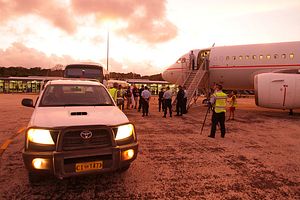In the past few days the Australian government has proposed legislation that will create an extra punitive burden on those seeking asylum in Australia. The proposed new law would prevent anyone who had attempted to seek asylum in Australia via a maritime route from July 2013 onward from obtaining any type of visa to Australia. This posits that if someone were found to be a refugee and resettled in a third country, they would then be prevented from obtaining even a business or tourist visa for Australia for the rest of their life.
Immigration Minister Peter Dutton explained that this proposed legislation is designed to prevent refugees from “country hopping” after being released from Australia’s detention centers on Nauru and Manus Island in Papua New Guinea. This makes the self-involved assumption that, were refugees to be resettled in a suitable country, they would still yearn to move to a country that has treated them so poorly.
Dutton says the advice the government has received indicates that this new law would not be in conflict with Australia’s obligations as a signatory to the 1951 United Nations’ Convention relating to the Status of Refugees. Article 31 of the convention states that signatories “shall not impose penalties, on account of their illegal entry or presence, on refugees.” Earlier this year the United Nations ruled that Australia had violated the International Covenant on Civil and Political Rights due to the indefinite detention of a number of people found to be refugees.
The government has recently increased Australia’s refugee intake via “official” channels to 18,750, but maintained their position that there is a “right” or “orderly” way to seek asylum, despite how divorced this perspective is from the lived experience of seeking asylum. Prime Minister Malcolm Turnbull reiterated this posture when he stated in regards to the proposed legislation that “[o]ur ability to be generous to refugees, our ability to take those large numbers of refugees is there because we maintain the security of our borders, because we decide who is coming here.”
Yet the continued demonization of those who have attempted to seek asylum in Australia creates a culture of suspicion toward anyone who has been granted refugee status (or even looks like they have). In the past week a Sudanese refugee saved 11 people from a burning bus in Brisbane, an occurrence that should hopefully undermine some of the suspicion toward refugees the government has created. Yet refugees shouldn’t have to commit acts of great bravery to be deemed worthy of Australian society’s respect.
The immigration minister has been proudly advertising that over 800 days have passed without any asylum seekers attempting to reach Australia by sea. This indicates that, having solved the problem of people seeking asylum via maritime routes, this new punitive measure is being deployed solely for political purposes.
It has come as no surprise then that the far-right One Nation party has taken credit for the proposed legislation. Australia’s initial hardline stance against those seeking asylum can be viewed partly as an attempt to appease One Nation during their earlier electoral success in the late 1990s and early 2000s.
For the past few decades the parties of the conservative Coalition have maintained an electoral strategy of throwing bones to reactionary voters in order to keep them under their wing and prevent populist parties from gaining traction outright. Yet the recent resurgence of the One Nation party, alongside the rise of a number of other conservative forces, has proven that this strategy of appeasement hasn’t worked.
Instead of bringing these voters back toward more mature parties, the Coalition has shifted the norms of what is ethically acceptable in Australia’s democracy, and as a result moved the politics of grievance to more aggressive positions. With each policy aimed at bringing these voters back into the center-right fold, the more the Coalition themselves have moved away from this political terrain, and the more forceful policies parties like One Nation have demanded.
This new piece of legislation can been seen as the latest attempt at this strategy. It is a strategy that has relied on an assumption that the combative ignorance of parties like One Nation will be a permanent feature of Australian society, and that the politics of education and persuasion are far too difficult deploy.
The parties of government in Australia have not acted responsibly in providing the requisite platforms and opportunities for the public to understand and integrate into the modern globalized world. Instead they have chosen to mine for votes using people’s fear of difference and fear of change. People fleeing violent and unstable situations that native Australians could never come close to experiencing are the strategic victims of this political laziness.
There is one positive that could potentially come from this legislation, though. It potentially opens the door for the government to accept New Zealand’s offer to take some of the refugees in Australia’s offshore detention centers. Previously this was rejected by the government as it would provide a “backdoor” into Australia if refugees were granted New Zealand citizenship. Even if the legislation is motivated by cynical politicking on the government’s behalf, it could at least provide an opportunity for a number of refugees to find some security and normalcy.

































